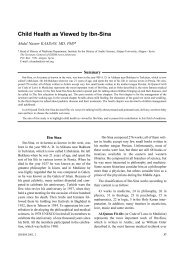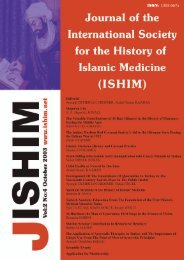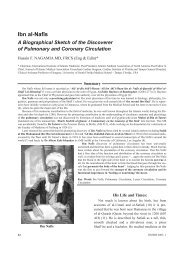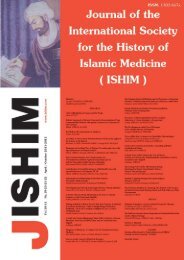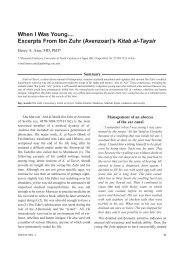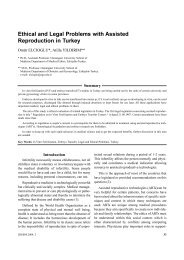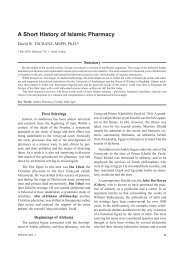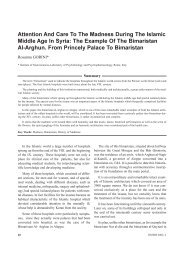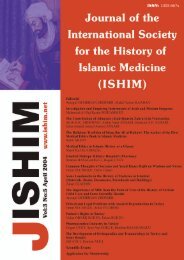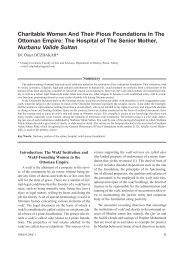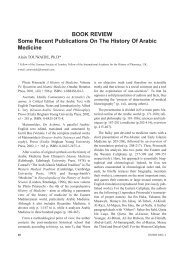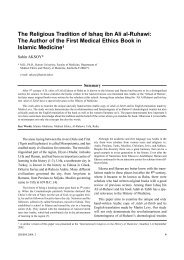Journal - International Society for the History of Islamic Medicine
Journal - International Society for the History of Islamic Medicine
Journal - International Society for the History of Islamic Medicine
Create successful ePaper yourself
Turn your PDF publications into a flip-book with our unique Google optimized e-Paper software.
ISLAMIC MEDICAL ETHICS IN ASSISTED CONCEPTION<br />
who will nurture and deliver <strong>the</strong> baby? The recipient<br />
<strong>of</strong> <strong>the</strong> embryo who nurtures and delivers <strong>the</strong> baby<br />
will be <strong>the</strong> mo<strong>the</strong>r, in concordance with <strong>the</strong> following<br />
verse.<br />
“None can be <strong>the</strong>ir mo<strong>the</strong>rs except those who<br />
gave <strong>the</strong>m birth” Q: 48:2<br />
The pregnancy would be within <strong>the</strong> ‘family’ and<br />
under <strong>the</strong> ‘marriage contract’ and <strong>the</strong> mixing <strong>of</strong> genes<br />
and family lineage are restricted to <strong>the</strong> ‘extended’<br />
family. These are intricate and difficult questions <strong>for</strong><br />
which answers are still awaited; <strong>the</strong> same holds <strong>for</strong> a<br />
Muslim couple who wishes to donate surplus<br />
embryos to o<strong>the</strong>r<br />
Unused Embryos<br />
It is common practice <strong>for</strong> surplus embryos to be<br />
ei<strong>the</strong>r donated, discarded, destroyed, stored or used<br />
<strong>for</strong> research according to <strong>the</strong> wishes <strong>of</strong> <strong>the</strong> couple. To<br />
date <strong>Islamic</strong> Fuqaha (jurists) have paid little heed to<br />
this aspect <strong>of</strong> reproductive medicine and <strong>the</strong> status <strong>of</strong><br />
<strong>the</strong> embryo. Are embryos living beings, do <strong>the</strong>y have<br />
any rights and are <strong>the</strong>y entitled <strong>for</strong> protection from<br />
harm? Islam considers any part <strong>of</strong> <strong>the</strong> human body as<br />
precious and sacred. It is surprising that <strong>the</strong> product<br />
<strong>of</strong> <strong>the</strong> union <strong>of</strong> sperm and egg, producing a living<br />
‘potential’ human, albeit a miniature one, has<br />
received scant respect and attention by <strong>the</strong> jurists, to<br />
date. Embryos are stored away encapsulated and<br />
frozen in steel cylinders, perhaps, never to see <strong>the</strong><br />
light <strong>of</strong> day; evoking Huxleyan nightmares <strong>of</strong> little<br />
genies, hibernating in hatcheries all over <strong>the</strong> globe.<br />
The concept <strong>of</strong> ‘pre embryo; which has been proposed<br />
to salve <strong>the</strong> conscience hardly solves <strong>the</strong> ethical<br />
issue. From a pragmatic viewpoint, it has to be<br />
conceded that an embryo is different to that <strong>of</strong> a<br />
growing foetus in utero. It is also true that <strong>the</strong>re is no<br />
guarantee <strong>of</strong> implantation and growth into a foetus.<br />
While this may be true, <strong>the</strong> embryo has at least <strong>the</strong><br />
status <strong>of</strong> a potential human and <strong>the</strong>re<strong>for</strong>e, merits<br />
some respect and dignity. Maybe <strong>the</strong> answer is to permit<br />
all surplus embryos to be donated to infertile non-<br />
Muslim couples. If this is not permissible, perhaps,<br />
<strong>the</strong> number <strong>of</strong> eggs produced should be tailored to<br />
give two healthy embryos. If despite this, <strong>the</strong>re are<br />
surplus embryos, indefinite storage should be dis-<br />
JISHIM 2004, 3<br />
Farouk MAHMOUD<br />
couraged and a time limit should be imposed.<br />
Embryos should be destroyed in <strong>the</strong> event <strong>of</strong> a<br />
divorce or death. Whe<strong>the</strong>r embryos could be donated<br />
<strong>for</strong> research is ano<strong>the</strong>r issue which awaits <strong>the</strong><br />
Fuqaha’s response.<br />
Surrogacy<br />
Where <strong>the</strong> mo<strong>the</strong>r has no womb or a womb which<br />
cannot nurture a pregnancy, <strong>the</strong> embryo is transferred<br />
to <strong>the</strong> womb <strong>of</strong> a surrogate, who would hand over <strong>the</strong><br />
baby to <strong>the</strong> ‘contracting couple’. Surrogacy may be<br />
partial where <strong>the</strong> husband contributes <strong>the</strong> sperm and<br />
gestational or full, where <strong>the</strong> surrogate provides no<br />
gametes which are derived from <strong>the</strong> husband and<br />
wife. Though gestational surrogacy was permitted,<br />
this permissibility has since been withdrawn by <strong>the</strong><br />
jurists. The reason is possibly that nurturing and<br />
delivering <strong>the</strong> baby confers mo<strong>the</strong>rhood, ra<strong>the</strong>r than<br />
biological, genetic contribution and procreation is<br />
outside <strong>the</strong> marriage contract. This caveat notwithstanding,<br />
<strong>the</strong>re is some justification <strong>for</strong> considering<br />
surrogacy as a <strong>for</strong>m <strong>of</strong> adoption. It is true that Islam<br />
does not recognise adoption in <strong>the</strong> conventional<br />
sense, stipulating that <strong>the</strong> genetic fa<strong>the</strong>r or his name,<br />
must be retained as <strong>the</strong> fa<strong>the</strong>r. Of course in gestational<br />
surrogacy, <strong>the</strong> sperm comes from <strong>the</strong> fa<strong>the</strong>r and<br />
<strong>the</strong>re<strong>for</strong>e he is <strong>the</strong> genetic, biological and <strong>the</strong> rearing<br />
fa<strong>the</strong>r. So <strong>the</strong>re should not be a problem <strong>of</strong> <strong>the</strong> commissioning<br />
couple ‘adopting’ this baby from <strong>the</strong> surrogate<br />
mo<strong>the</strong>r. Also. What is <strong>the</strong> situation <strong>of</strong> a cowife<br />
in a polygamous relationship being <strong>the</strong> surrogate.<br />
After all, <strong>the</strong> conception is within <strong>the</strong> marriage<br />
contract; modified perhaps but still within <strong>the</strong> same<br />
family. If <strong>the</strong> co-wife is agreeable, she is like a ‘wet<br />
nurse’ who provides succour to <strong>the</strong> foetus in-utero.<br />
Pre Implantation Genetic Diagnosis<br />
(PGD)<br />
PGD is an ingenious technique whereby <strong>the</strong> early<br />
embryo is tested <strong>for</strong> chromosomal or genetic abnormalities,<br />
and <strong>the</strong> normal embryo chosen <strong>for</strong> transfer.<br />
It is an excellent alternative to conventional pre-natal<br />
diagnosis and obviates <strong>the</strong> necessity <strong>of</strong> an abortion.<br />
“… <strong>the</strong> stage is set <strong>for</strong> a revolution in functional<br />
genomics and human genetics …Central to this revolution<br />
will be <strong>the</strong> gene chip, with <strong>the</strong> potential to iden-<br />
41



